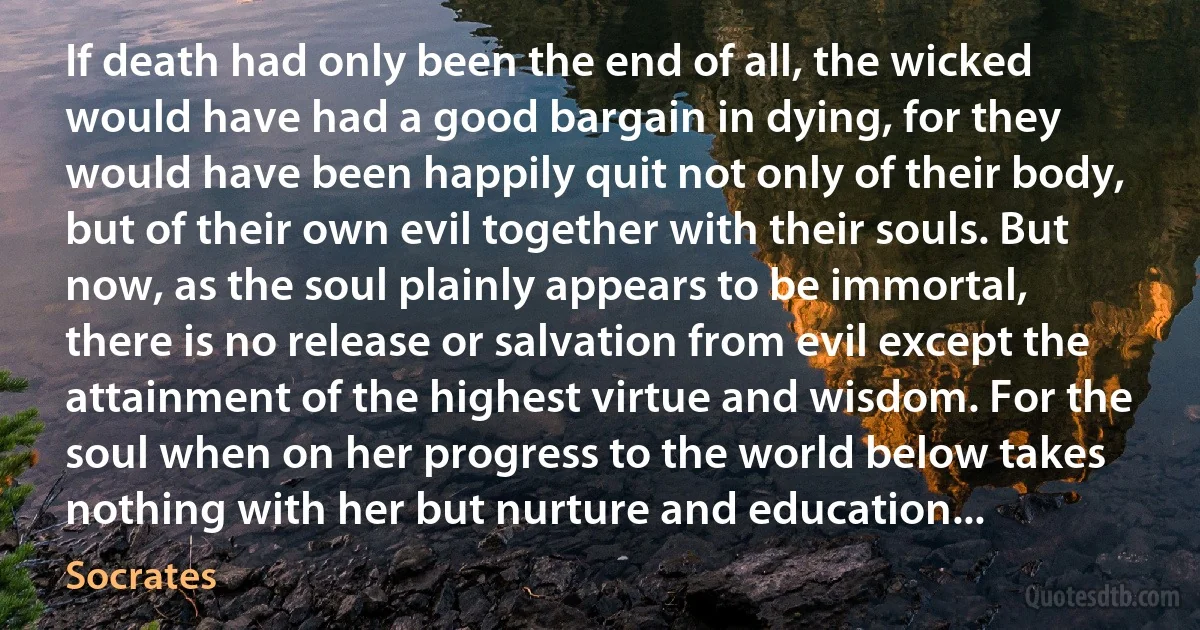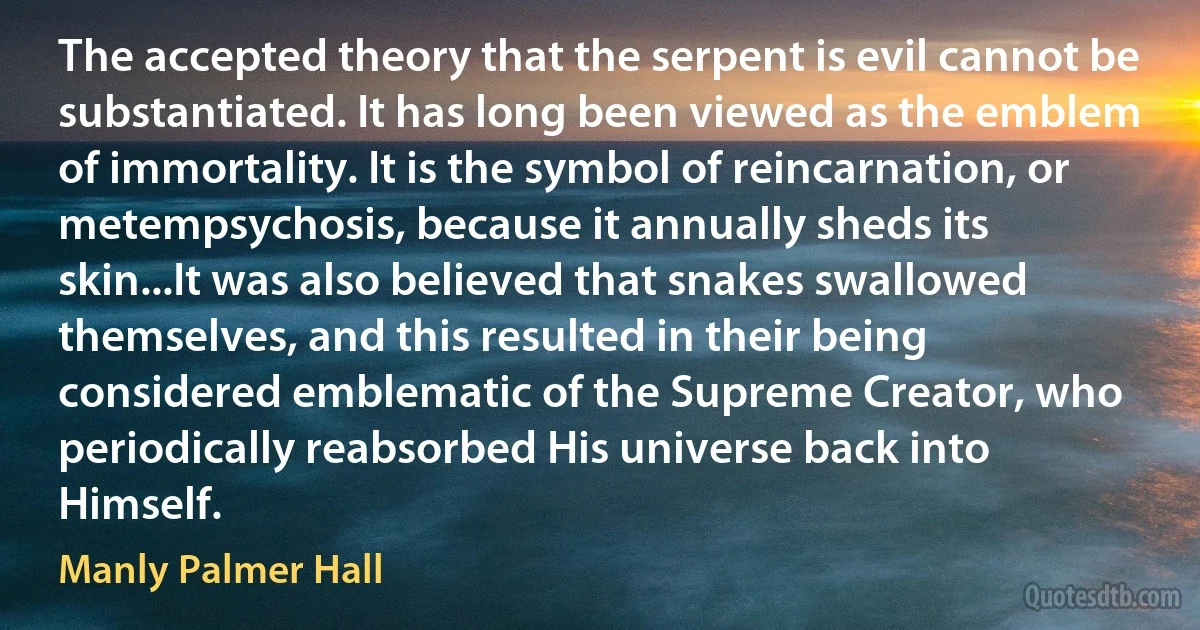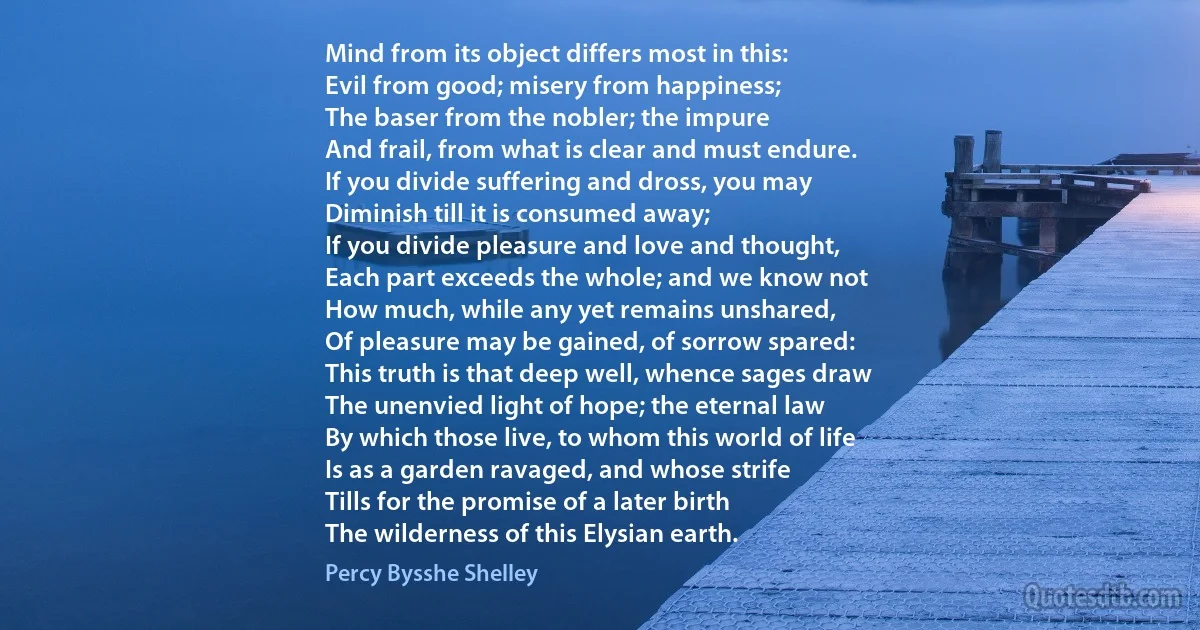Evil Quotes - page 83
We have said, and we will always say again, that we are opposed to the intervention of foreign military forces. But which was the lesser evil? Chaos, civil war, counter-revolution, and a new world war, or an intervention by Soviet troops? ... I say clearly that the first alternative was the worst thing that could have occurred, and the second, the intervention of Soviet troops, was a necessary evil.

Josip Broz Tito
As there are misanthropists, or haters of men, there are also misologists or haters of ideas, and both spring from the same cause, which is ignorance of the world. Misanthropy arises from too great confidence of inexperience; you trust a man and think him altogether true and good and faithful, and then in a little while he turns out to be false and knavish; and then another and another, and when this has happened several times to a man, especially within the circle of his most trusted friends, as he deems them, and he has often quarreled with them, he at last hates all men, and believes that no one has any good in him at all. ...The reason is that a man, having to deal with other men, has no knowledge of them; for if he had knowledge he would have known the true state of the case, that few are the good and few the evil, and that the great majority are in the interval between them.

Socrates
For what comes is Judgment: happy are those whom it finds labouring in their vocations, whether they were merely going out to feed the pigs or laying good plans to deliver humanity a hundred years hence from some great evil. The curtain has indeed now fallen. Those pigs will never in fact be fed, the great campaign against White Slavery or Governmental Tyranny will never in fact proceed to victory. No matter; you were at your post when the Inspection came.

C. S. Lewis
I live in the Managerial Age, in a world of "Admin." The greatest evil is not now done in those sordid "dens of crime" that Dickens loved to paint. It is not done even in concentration camps and labour camps. In those we see its final result. But it is conceived and ordered (moved, seconded, carried, and minuted) in clean, carpeted, warmed, and well-lighted offices, by quiet men with white collars and cut fingernails and smooth-shaven cheeks who do not need to raise their voice. Hence, naturally enough, my symbol for Hell is something like the bureaucracy of a police state or the offices of a thoroughly nasty business concern.

C. S. Lewis
If you are tired of the real landscape, look at it in a mirror. By putting bread, gold, horse, apple, or the very roads into a myth, we do not retreat from reality: we rediscover it. As long as the story lingers in our mind, the real things are more themselves. This book applies the treatment not only to bread or apple but to good and evil, to our endless perils, our anguish, and our joys. By dipping them in myth we see them more clearly.

C. S. Lewis
The Druids taught the people of Britain and Gaul concerning the immortality of the soul. They believed in transmigration and apparently in reincarnation. They borrowed in one life, promising to pay back in the next. They believed in a purgatorial type of hell where they would be purged of their sins, afterward passing on to the happiness of unity with the gods. The Druids taught that all men would be saved, but that some must return to earth many times to learn the lessons of human life and to overcome the inherent evil of their own natures.

Manly Palmer Hall
Habit... makes the endurance of evil easy (which, under the name of patience, is falsely honored as a virtue), because sensations of the same type, when continued without alteration for a long time, draw our attention away from the senses so that we are scarcely conscious of them at all. On the other hand, habit also makes the consciousness and the remembrance of good that has been received more difficult, which then gradually leads to ingratitude (a real vice). [...] Acquired habit deprives good actions of their moral value because it undermines mental freedom and, moreover, it leads to thoughtless repetitions of the same acts (monotony), and thus becomes ridiculous.

Immanuel Kant
The real struggle today, just as in the second quarter of the nineteenth century, is between a view of the world termed liberalism or radicalism, for which the primary object of government and of foreign policy is peace, freedom of trade and intercourse, and economic wealth and that other view, militarist or rather diplomatic, which thinks in terms of power, prestige, national or personal glory, the imposition of a culture and hereditary or racial prejudice. To the good English radical, the latter is so unreal, so crazy in its combination of futility and evil, that he is often in danger of forgetting or disbelieving its actual existence.

John Maynard Keynes
Inflation is unjust and Deflation is inexpedient. Of the two perhaps Deflation is, if we rule out exaggerated inflations such as that of Germany, the worse; because it is worse, in an impoverished world, to provoke unemployment than to disappoint the rentier. But it is not necessary that we should weigh one evil against the other. It is easier to agree that both are evils to be shunned.

John Maynard Keynes
Covetousness, and the desire of having in our possession, and under our dominion, more than we have need of, being the root of all evil, should be early and carefully weeded out, and the contrary quality of a readiness to impart to others, implanted. This should be encourag'd by great commendation and credit, and constantly taking care that he loses nothing by his liberality.

John Locke



